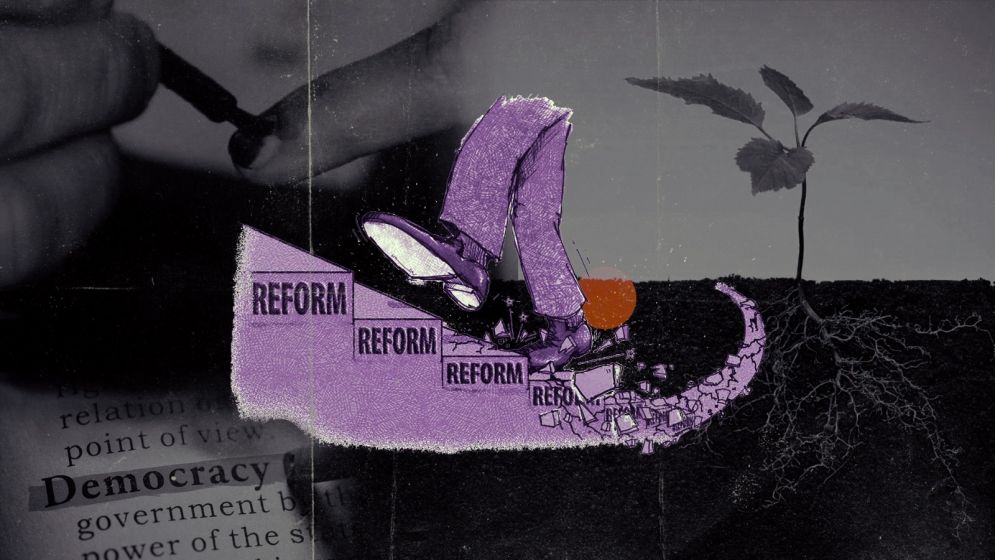Accountability to the electorate is the soil and without it, no reform can’t take root

A few circulating Facebook posts have begun to voice what many within Dhaka’s political class have been whispering for weeks: that elements within the state machinery–officials at the National Board of Revenue, segments of the bureaucracy, and even the police–are quietly obstructing the interim government’s reform agenda.
Not through open rebellion, but through calculated non-cooperation.
To some, this quiet sabotage may look like a post-Awami League symptom–resistance from a system still loyal to the old order. But this isn't new. The unaccountable behavior of state institutions has long thrived under Bangladesh’s broken political compact, where bureaucratic power often becomes a tool of delay, resistance, or quiet coercion.
The deeper problem isn’t just administrative friction–it’s political legitimacy, or more precisely, the perception of it.
Since the interim government, led by Professor Muhammad Yunus, was not installed through a traditional electoral process, critics argue it lacks the popular mandate to govern decisively. On the other side, supporters insist the July mass uprising that toppled the previous government constitutes an implicit mandate–a kind of revolutionary legitimacy–to implement urgent reforms.
Both are partly right. And both are dangerously incomplete.
The truth is, the interim government does hold a moral and popular mandate derived from the mass protests. But what it lacks is a revocable mandate–one grounded in electoral accountability.
In a normal democracy, politicians are incentivized to act because they can be removed at the ballot box. That lever doesn’t exist for the Yunus government. The civil service knows it. The police know it. And so, inertia sets in. Not outright defiance–just enough passive resistance to ensure paralysis.
This dysfunction is well known to me. I’ve lived it.
Years ago, while working in a rural hospital, I was regularly pressured to issue false certificates–injury reports for lawsuits, fitness notes for jobs, disability claims for state allowances.
Yes, some doctors caved for profit. But often the real coercion came from elected local officials–union chairmen and village members who saw these papers as political currency.
To survive, I developed a tactic. I collected newspaper clippings about doctors prosecuted for issuing false certificates and kept them in a file. Whenever I was pushed, I’d pull out the file and say: “Will you attend court on my behalf? If so, I’ll issue the certificate with your name attached.”
It didn’t end the pressure, but it quieted the room.
The lesson was clear: power retreats when accountability enters the conversation. Even local strongmen became hesitant when they feared exposure or consequence.

Accountability as deterrence
The same principle holds for national governance. When institutions–whether bureaucracies or political offices–know they cannot be held accountable by the people, they behave as though they answer to no one.
Without a credible mechanism for renewal or removal, even well-intentioned reform becomes a hollow exercise.
Bangladesh’s interim government may have inherited a moment, but it hasn’t yet built a mandate that can outlast it. Until a system is in place where leaders are accountable not just to the memory of a protest, but to the living, breathing will of the people expressed through the ballot box, the machinery of the state will continue to drag its feet–quietly, deliberately, and with impunity.
And the reforms we so desperately need will remain nothing more than declarations on paper, ignored by those with the power to implement them–and no incentive to try.
In Bangladesh, we’ve long been conditioned to view accountability as a burden–an obstacle, an inconvenience, a bureaucratic hassle. But what we fail to understand is that accountability, when it functions, is not just a constraint. It is also a shield.
It protects the honest, strengthens the principled, and gives public servants and politicians alike the leverage to say no.
Take, for example, something as mundane–and corrupt–as a local road tender. Imagine a system where 80 to 90 percent of those caught rigging tenders actually faced punishment. In that scenario, even if a few still dared to take the risk, no one could credibly pressure you into complicity.
Because the cost of corruption would be high, and–critically–you could point upward, to a functioning system of accountability, and say, “No, I won’t do it.”
The same logic applies to politics. If a government comes to power on promises of tax reform, administrative overhaul, and healthcare restructuring, and the electorate is aware and empowered enough to vote it out for failing to deliver–then even hostile bureaucrats would have to listen.
You could say to them, “I don’t have the luxury of inaction. If I don’t push these reforms through, I’m out of office. The public will hold me to it.”
In that kind of environment, your vulnerability becomes your strength, because everyone knows the voters–not the bureaucrats, not the military, not the foreign donors–ultimately decide your fate.
But what happens when that chain of accountability is broken? When bureaucrats know you’re not really answerable to the public–only to some vague “spirit of ’71” or the romanticism of a July uprising? When you’re not a public servant but the political equivalent of a sponsor’s son, insulated from consequence and immune to electoral judgment?
What happens is exactly what we’re seeing now.
The breaking up of structure
You become the pressure point. Every demand, every petty interest, every act of institutional blackmail flows upward–toward you. Because they know you have no higher authority to appeal to. No electorate to fear. And no legitimacy to stand on if you try to push back.
You are not negotiating from a position of democratic power. You are managing chaos with no leverage. You are the system’s soft target.
And ironically, that’s the same trap the previous Awami League government fell into. By hollowing out the electoral process and neutering accountability, they became captives of the very bureaucratic machinery they thought they controlled.
They could not offload political pressure because they had no credible mechanism of public mandate left to lean on. So, they too became slaves to the system they believed they dominated.
In today’s Bangladesh, we have created a strange, self-defeating model of governance: politicians seek unchecked power by denying the people their vote–only to find themselves utterly beholden to unaccountable bureaucrats and security elites.
They become figureheads, flying off to Dubai, Qatar, or Thailand for photo ops and spa treatments, while their decisions are quietly dictated by others behind the scenes.
They believe they have arrived–ascended, even–because no one can vote them out. But what they’ve really inherited is a cage of their own making. The absence of accountability doesn’t free them.
It strips them of the very thing that gives leadership its strength: the ability to say, “No, the people come first.”
Without electoral revocability, reform will always be hostage. And in that system, even the honest must negotiate with fear, while the corrupt operate with impunity.
Given the structural limitations and political fragility of the interim setup, I’ve maintained from the outset: this government is in no position to carry out sweeping reforms. It simply lacks the mandate, the leverage, and the institutional buy-in to push through deep systemic change.
What it can–and must–do is stick to the basics. Where broad consensus already exists, and where inaction would amount to political betrayal, it should act. On everything else, it should defer.
Reform, at this stage, should take the shape of proposals–guidelines to be debated, refined, and, ideally, absorbed into the manifestos of the parties vying for power in the next election. Let those with a formal public mandate own the implementation.
That is how democratic legitimacy works.
What’s more urgently needed now is a shift in the public conversation: from the abstraction of reform to the mechanics of accountability. We need a civic narrative grounded in concrete demands–free and fair elections, a genuinely independent media, and robust transparency mechanisms. These are the guardrails that make any future reform sustainable.
We should be asking sharper questions: Which parties are putting real reforms in their manifestos? Which ones are offering timelines and enforcement mechanisms? And which are simply offering platitudes?
In this moment, our political culture must evolve beyond passive spectatorship. Reformist rhetoric must be matched with public expectation–and consequence.
The message to all political actors should be unambiguous: deliver, or be replaced. That is not just good for governance. It’s essential for rebuilding public trust. And, in the long run, it is the only viable path for any party that claims to act in the public interest.
—
Mikail Hossain is a researcher and analyst

